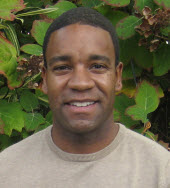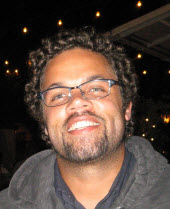W.E.B. Du Bois Fellowship Program: Biographies of Fellows
Following are short biographies of the W.E.B. Du Bois Fellowship winners, when available.
- Dr. Jana Arsovska, 2012
- Dr. Anthony A. Peguero, 2012
- Dr. Bianca Bersani, 2011
- Dr. Stephanie DiPietro, 2011
- Dr. Ojmarrh Mitchell, 2011
- Dr. Hung-En Sung, 2010
- Dr. Holly Ventura Miller, 2008
- Dr. Chris Gibson, 2008
- Dr. Cynthia Lum, 2007
- Dr. Amy Farrell, 2006
- Dr. Geoff Ward, 2006
- Dr. Eric A. Stewart, 2005
- Dr. Johnna Christian, 2004
- Dr. Ivory Toldson, 2003

Dr. Jana Arsovska
2012 Fellow
Dr. Jana Arsovska, a native of Macedonia, is an Assistant Professor in the Sociology Department at John Jay College of Criminal Justice in New York. She holds a PhD degree in Criminology from Leuven University in Belgium where she studied the role of cultural codes in the evolution of ethnic Albanian organized crime groups. Her research interests include culture, migration and organized crime, female offenders and transnational crime, as well as corruption and radical Islam in post-conflict societies. Dr. Arsovska has published extensively on Balkan organized crime and human trafficking in scholarly journals and intelligence magazines and is the co-editor of the book Restoring Justice After Large-Scale Conflict: Kosovo, Congo and the Israeli-Palestinian Case. She is currently working on her new book, Decoding Albanian Organized Crime. Dr. Arsovska has acted as a consultant on organized crime for many organizations, including the World Bank. Prior to her current post, she underwent training at INTERPOL's criminal analysis unit. Dr. Arsovska is a recipient of the National Institute of Justice's 2012 W.E.B. Du Bois Fellowship for research examining the relation between migration and transnational organized crime. Her study, focusing on ethnic Albanians in New York City, seeks to examine how organized crime groups operate across territories, and whether they are able to reproduce their territorial control in foreign countries.
Description of Dr. Arosvksa's research funded under this fellowship.

Dr. Anthony A. Peguero
2012 Fellow
Anthony A. Peguero is an assistant professor of Sociology and research affiliate of the Center for Peace Studies and Violence Prevention at Virginia Tech. He earned his BA in sociology and English, an MA in sociology, and an M.S. in criminal justice from Florida International University. He received his PhD in sociology from the University of Miami in 2006. His research interests involve youth violence and juvenile justice, youth socialization and marginalization, school bullying, gender, race and ethnicity, and the adaptation of the children immigrants. He serves as a consultant on the Cartoon Network's campaign against bullying, and the editorial board for the journal of Youth Violence and Juvenile Justice and the Crime and Deviance Section of Sociology Compass. Dr. Peguero is also a member of the Racial Democracy, Crime, and Justice Network which holds the dual goals of advancing research on the intersection of race, crime and justice and of promoting racial democracy within the study of these issues by supporting junior scholars from under-represented groups. Some of Dr. Peguero's research has been published in Crime and Delinquency, Youth & Society, Journal of Criminal Justice, Punishment & Society, Journal of Ethnicity and Criminal Justice, and Journal of Interpersonal Violence.
Description of Dr. Peguero's research funded under this fellowship.
Dr. Bianca E. Bersani
2011 Fellow
Dr. Bianca E. Bersani is an assistant professor in the Department of Sociology at the University of Massachusetts Boston. She earned her B.A. in sociology and psychology and an M.A. in sociology from the University of Nebraska—Lincoln. She received her Ph.D. in criminology and criminal justice from the University of Maryland, College Park, in 2010, where her dissertation research received the University of Maryland Distinguished Dissertation Award for the Social Sciences. Her research interests include examining patterns and predictors of offending over the life course, the impact of life transitions on desistance from crime, criminological theory, and immigration and crime. Her current research focuses on investigating the mechanisms promoting desistance from crime and examining the generalizability of the marriage effect across race, ethnicity, nativity, and culture. Her research has appeared in scholarly journals, including Justice Quarterly, the Journal of Quantitative Criminology, the Journal of Research in Crime and Delinquency, and the Journal of Early Adolescence. Dr. Bersani was a co-recipient of the National Institute of Justice’s 2011 W.E.B. Du Bois Fellowship for research examining the relationship between marriages and offending for U.S. immigrants with a particular focus on potential racial, ethnic, immigrant generation and nativity disparities.
Description of Dr. Bersani's research funded under this fellowship.
Dr. Stephanie M. DiPietro
2011 Fellow
Dr. Stephanie M. DiPietro is an Assistant Professor in the Department of Criminology and Criminal Justice at the University of Missouri—St. Louis. She received her M.A. in sociology from George Washington University and her Ph.D. in criminology and criminal justice from the University of Maryland, College Park, in 2010. Her research focuses primarily on the adaptation outcomes of immigrants, with particular emphasis on youth violence and delinquency. Currently, Dr. DiPietro is using data from the Project on Human Development in Chicago Neighborhoods (PHDCN) to examine the role of family and peer processes in explanations of immigrant criminality. In addition, she is undertaking a study of Bosnian refugees in the city of St. Louis, and examining the intersection of individual, family and community dynamics in explanations of crime and substance use. Her research appears in the journals, Criminology, Social Forces, and The Annals of the American Academy of Political and Social Science. She is a co-recipient of the 2011 W.E.B. Du Bois Fellowship from the National Institute of Justice, for research examining the relationships among race-ethnicity, immigrant status, marriage, and offending.
Description of Dr. DiPietro's research funded under this fellowship.
Dr. Ojmarrh Mitchell
2011 Fellow
Dr. Ojmarrh Mitchell is an Associate Professor in the Department of Criminology at the University of South Florida. Professor Mitchell earned his Ph.D. in criminal justice and criminology from the University of Maryland, College Park, with a doctoral minor in measurement, statistics and evaluation. His research interests include race/ethnicity and crime, drugs and crime, courts and sentencing, and systematic reviews of scientific research. Professor Mitchell’s past research includes a National Institute of Justice-funded meta-analysis of race and sentencing research, the National Evaluation of the Breaking the Cycle Demonstration Project (with Adele Harrell), the National Evaluation of Juvenile Correctional Facilities (with Doris L. MacKenzie), a randomized experimental evaluation of the Maryland Correctional Boot Camp (with Doris L. MacKenzie), and meta-analytic reviews of the effectiveness of drug courts and incarceration-based drug treatment in reducing recidivism (with David B. Wilson and Doris L. MacKenzie). In 2011, Professor Mitchell was awarded the National Institute of Justice's W.E.B. Du Bois Fellowship to study racial/ethnic disparities in drug arrests and the effects of drug sanctions on subsequent drug offending and social bonding.
Description of Dr. Mitchell's research funded under this fellowship.
Dr. Hung-En Sung
2010 Fellow
Dr. Hung-En Sung joined the John Jay College of Criminal Justice in 2006. He specializes in substance abuse, offender rehabilitation, correctional health, and comparative analysis of crime and justice. In the area of substance abuse policy, his current work focuses on the treatment of chronic offenders with co-occurring disorders, the therapeutic mechanisms of faith-based recovery interventions, and racial disparities in the processing of DWI cases. Using national datasets and records from local agencies, Professor Sung is assessing the effect of morbidity and healthcare needs on recidivism among offenders under institutional or community supervision. He is also examining, prospectively, the desistance-recidivism pathways of violent juvenile delinquents released from Rikers Island, New York City. His cross-national research has revolved around the impact of democratization on crime, corruption, and criminal justice operations. Prior to his appointment at John Jay College, Professor Sung served as a research associate in the Division of Policy Research and Analysis at the National Center on Addiction and Substance Abuse at Columbia University (2001-2006) and as a research analyst at the Kings County (Brooklyn) District Attorney's Office (1996-2001). He has published extensively and has been invited to share his work in Asia, Latin America and the United Nations.
Description of Dr. Sung's research funded under this fellowship.

Dr. Holly Ventura Miller
2008 Fellow
Dr. Holly Ventura Miller received her Ph.D. in sociology from the University of South Carolina in 2006 and currently serves as Assistant Professor of Criminal Justice at the University of Texas at San Antonio (USTA). Her research areas include immigration and crime, juvenile delinquency, drug abuse treatment, and program evaluation. She has published more than two dozen refereed articles in journals such as Justice Quarterly, Crime and Delinquency, and the Journal of Criminal Justice, and has participated in numerous research projects funded by federal and state agencies including the National Institute of Justice, the Bureau of Justice Assistance, and the Texas State Legislative Budget Board.
Dr. Miller was awarded the National Institute of Justice's W.E.B. Du Bois Fellowship in 2009 to study the effects of acculturation on crime and victimization among Hispanic adolescents. More recently, she was awarded the NIJ Crime and Justice Investigator-Initiated Research grant, along with colleagues at USTA, to conduct a multi-state process and outcome evaluation of prison-based alcohol treatment services in Montana, Ohio, and Texas. Dr. Miller's most recently published research has focused on acculturation and crime, coercive treatment in prisons, the effectiveness of therapeutic communities on recidivism and relapse, and the long-term effects of self-control on health outcomes.
Abstract of Dr. Ventura's completed research funder under this fellowship.

Dr. Chris Gibson
2008 Fellow
Dr. Chris Gibson is an Associate Professor in the Department of Sociology and Criminology & Law at the University of Florida. His research focuses on the independent and interactive influences of individual differences and environments/contextual influences on children's and adolescents’ antisocial behaviors, victimization, and the societal consequences of crime. He has published more than 70 scholarly works, including peer-reviewed journal articles, book chapters, and federal reports. His articles have appeared in various academic journals including Crime and Delinquency, Criminal Justice and Behavior, the Journal of Research in Crime and Delinquency, the Journal of Quantitative Criminology, Justice Quarterly, the Journal of Youth and Adolescence, and Youth Violence and Juvenile Justice. His book (with Marvin Krohn) titled Handbook of Life-Course Criminology: Emerging Trends and Directions for Future Research will be published by Springer-Verlag in 2012.
Dr. Gibson was awarded the National Institute of Justice's W.E.B Du Bois Fellowship in 2009 to study how the influence of acculturation on crime and victimization among Hispanic adolescents is explained by the neighborhood contexts in which they reside, and by the individual level differences that make more acculturated youth different from those less acculturated.
Abstract of Dr. Gibson's completed research funder under this fellowship.

Dr. Cynthia Lum
2007 Fellow
Dr. Cynthia Lum is the Deputy Director and Assistant Professor of the Center for Evidence-Based Crime Policy in the Department of Criminology, Law and Society at George Mason University. She conducts research primarily in the area of policing. Her works in this area have included evaluations of policing interventions for crime prevention effectiveness, examining place-based determinants of street-level police decision-making, understanding counterterrorism efforts by state and local law enforcement, and examining the relationship between drugs and violence using large policing datasets. With Christopher Koper (Police Executive Research Forum) and Cody Telep (Mason), Dr. Lum has developed the Evidence-Based Policing Matrix, a translation tool designed for police practitioners to better institutionalize and utilize research on "what works" in policing into their strategic and tactical portfolio. She recently completed a randomized controlled experiment in evaluating license-plate recognition technologies.
Abstract of Dr. Lum's completed research funded under this fellowship.

Dr. Amy Farrell
2006 Fellow
Dr. Amy Farrell is an Assistant Professor in the School of Criminology and Criminal Justice at Northeastern University. Her research focuses on the administration of justice with primary emphasis on measuring the effect of race and gender in police, prosecution and sentencing practices. She has also conducted research on police legitimacy and law enforcement responses to new crimes such as hate crime and human trafficking. She is currently overseeing a national human trafficking data collection program for the Bureau of Justice Statistics and a study of the prosecution of human trafficking cases for the National Institute of Justice. Dr. Farrell has testified about law enforcement identification of human trafficking before the U.S. House of Representatives Judiciary Committee. Her research has appeared in numerous scholarly publications including recent articles in Crime and Delinquency, Law and Society Review, Criminology and Public Policy, and the Annals of the Academy of Political and Social Science. Dr. Farrell was a co-recipient of the National Institute of Justice's W.E.B. Du Bois Fellowship on Crime Justice and Culture in 2006. She received her Ph.D. in law, policy and society from Northeastern University in 2001.
Abstract of Dr. Farrell's completed research funded under this fellowship.

Dr. Geoff Ward
2006 Fellow
Dr. Geoff Ward is Associate Professor of the Departments of Criminology, Law & Society and Sociology at the University of California, Irvine. He studied sociology at Hampton University (B.A., 1994) and the University of Michigan (Ph.D., 2001) and has been a Mellon Postdoctoral Fellow at the Vera Institute of Justice, and a visiting scholar in African-American Studies at Columbia University. In 2006 he was a co-recipient of the National Institute of Justice's W.E.B. Du Bois Fellowship to support research on racial balance in representation among federal court authorities and its relation to parity in sentencing. His work combines historical and sociological methods to examine the racial politics of social control, with emphasis on the racial history of juvenile justice, juvenile and federal courts, social movements, and racial group representation in justice-related occupations. His publications appear in various academic journals and anthologies. He is the author of The Black Child-Savers: Racial Democracy and American Juvenile Justice (2012), a study of the rise, fall and lasting remnants of Jim Crow juvenile justice (University of Chicago Press).
Abstract of Dr. Ward's completed research funded under this fellowship.

Dr. Eric A. Stewart
2004 Fellow
Dr. Eric A. Stewart is an Associate Professor in the College of Criminology and Criminal Justice at Florida State University. He earned a B.A. in criminal justice from Fort Valley State University (1995). He holds an M.S. in sociology from Auburn University (1996), and a Ph.D. in sociology from Iowa State University (2000). He is a member of the Racial Democracy, Crime and Justice Network. Dr. Stewart was also a W.E.B. Du Bois Fellow with the National Institute of Justice and a member of the National Consortium on Violence Research (NCOVR). His research interests include racial inequality and criminal outcomes, crime over the life course, and contextual- and micro-processes in adolescent development. He has published articles in Criminology, the Journal of Research in Crime and Delinquency, Justice Quarterly, and the Journal of Quantitative Criminology.
Abstract of Dr. Stewart's completed research funded under this fellowship.

Dr. Johnna Christian
2004 Fellow
Dr. Johnna Christian received her Ph.D. in criminal ustice from the University at Albany and is currently an Assistant Professor in the School of Criminal Justice at Rutgers University, Newark. Her research focuses on the impact of incarceration on prisoners' families and communities, and on prisoner reentry. In 2005, she received the National Institute of Justice's W.E.B. Du Bois Fellowship to support a research project examining family members' connections to incarcerated individuals. Her work has been published in the Journal of Contemporary Criminal Justice, the Journal of Criminal Justice, the Journal of Contemporary Ethnography and the Journal of Offender Rehabilitation. She is co-editor of the book, How Offenders Transform Their Lives (Willan Publishing).

Dr. Ivory A. Toldson
2003 Fellow
Dr. Ivory A. Toldson is Associate Professor at Howard University, Senior Research Analyst for the Congressional Black Caucus Foundation and Editor-in-Chief of The Journal of Negro Education. In 2003, Dr. Toldson received the National Institute of Justice's W.E.B. Du Bois Fellowship for his research on methods to detect propensities toward racial and sexual civil violations among police officer candidates. Dr. Toldson has produced more than 40 articles and research presentations in 29 U.S. states, Paris, Dominican Republic, Scotland and the Republic of South Africa. Dr. Toldson is the author of the "Breaking Barriers" series, which analyzes academic success indicators from national surveys that, together, give voice to nearly 10,000 black male pupils from schools across the country. His most recent research focuses on the role of schools and the American educational system in reducing the number of black males in contact with the juvenile justice system. Dr. Toldson was named "Young Researcher of the Year" at Southern University and was featured in the Howard University Quest Magazine article, "Improving the Lives of African-American Males in the 21st Century." He won EboNetwork's Changing Faces Award for Outstanding Literary Achievement for his novel, Black Sheep. He received his Ph.D. from Temple University and has held teaching and research positions at Emory University, Drexel University, Morehouse School of Medicine and Southern University.
Abstract of Dr. Toldson's completed research funded under this fellowship.

